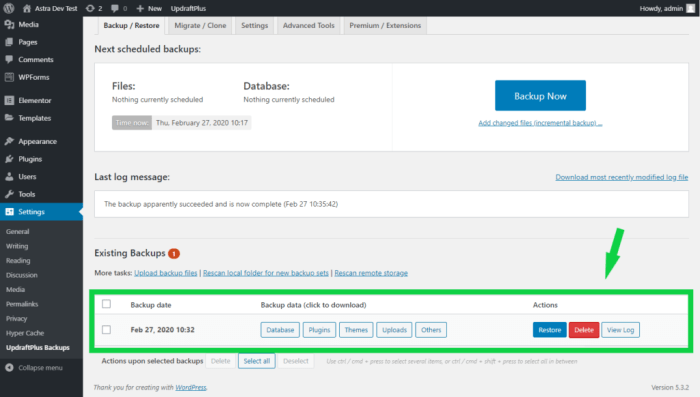How to Automatically Backup Your WordPress Site – Losing your website data can be a catastrophic event. Hours, days, even weeks of hard work, valuable content, and crucial customer information can vanish in an instant due to a server crash, hacking attempt, or even a simple plugin error. That’s why implementing a robust and automated WordPress backup strategy is not just recommended – it’s essential. This comprehensive guide will walk you through various methods for automatically backing up your WordPress site, ensuring your peace of mind and business continuity.
Understanding the Importance of WordPress Backups
Before diving into the how-to, let’s reiterate why regular backups are paramount for any WordPress website, regardless of size or complexity. A comprehensive backup strategy protects you from:
- Data loss due to server issues: Server crashes, hardware failures, and data corruption can all lead to significant data loss.
- Malware and hacking attacks: Hackers can compromise your website, delete files, or inject malicious code. A backup allows you to restore your site to a clean state.
- Plugin or theme conflicts: A poorly coded plugin or theme update can sometimes break your website. A backup acts as a safety net.
- Human error: Accidental file deletion or database modifications can easily happen. Backups prevent irreversible damage.
- implications: Downtime due to data loss can negatively impact your search engine rankings and organic traffic.
Regular backups, ideally automated, are the cornerstone of a solid WordPress security and maintenance plan. They’re your insurance policy against unexpected events.

Source: backblaze.com
Methods for Automating WordPress Backups
There are several effective ways to automate your WordPress backups. We’ll explore the most popular and reliable options:
1. Using WordPress Backup Plugins, How to Automatically Backup Your WordPress Site
Numerous plugins offer automated backup functionality. These plugins typically provide a user-friendly interface for scheduling backups and managing backup files. Popular choices include:
- UpdraftPlus: A highly-rated free plugin with a premium version offering additional features like offsite backups.
- BackupBuddy: A popular premium plugin known for its comprehensive features and reliable performance. It offers both local and offsite backups.
- WP Time Capsule: Another premium option providing automated backups and restoration capabilities.
- VaultPress (by Jetpack): Integrated with Jetpack, this premium service provides automatic backups and security features.
How to use a backup plugin (general steps):
- Install and activate the chosen plugin from your WordPress dashboard.
- Configure the plugin’s settings to specify backup frequency (daily, weekly, etc.), backup destination (local server, cloud storage), and files to be included (database, files, etc.).
- Test the backup process to ensure it’s working correctly.
- Regularly review your backups and delete old ones to manage storage space.
Remember to choose a plugin with good reviews and a strong reputation. Read the documentation carefully to understand its features and settings.
2. Utilizing Your Hosting Provider’s Backup Services
Many web hosting providers offer built-in backup solutions as part of their hosting packages. These services often automate the backup process and provide easy access to your backups. Check with your hosting provider’s documentation to see if they offer this feature. This is often a convenient option, as it’s integrated directly into your hosting environment.

Source: wpastra.com
3. Employing a Cloud Storage Service and Scripting
For advanced users, a combination of cloud storage (like Amazon S3, Google Cloud Storage, or Dropbox) and scripting (using tools like `wp-cli` or similar) can provide a highly customized and automated backup solution. This approach offers maximum control but requires technical expertise. This method involves setting up a script that automatically connects to your WordPress site, creates a backup, and uploads it to your chosen cloud storage location.
This requires more technical skill and setup, but provides robust and flexible backup options.
4. Database Backups Separately
While comprehensive plugins back up your entire site, consider separately backing up your WordPress database. This is crucial as the database holds all your posts, pages, comments, and other critical data. You can use phpMyAdmin (if accessible through your hosting control panel) or command-line tools like `mysqldump` to create regular database backups. This is an additional layer of protection and can be automated using cron jobs (discussed below).
Scheduling Automated Backups using Cron Jobs
Cron jobs are automated tasks scheduled to run at specific intervals. They are a powerful tool for automating backups, whether you’re using a plugin or a custom scripting solution. The exact method for setting up cron jobs varies depending on your hosting provider. Most providers offer a control panel where you can easily create and manage cron jobs.
You’ll need to specify the command to run your backup script or plugin’s backup function, and the schedule (e.g., daily, weekly).
Best Practices for WordPress Backups
To maximize the effectiveness of your automated backup strategy, follow these best practices:
- Regular backups: Aim for daily or at least weekly backups, depending on how frequently your website content changes.
- Offsite backups: Store your backups in a location separate from your web server to protect against server failures or hacking attempts. Cloud storage is ideal.
- Version control: Keep multiple backup versions, allowing you to revert to an earlier state if necessary.
- Test restorations: Periodically test your restoration process to ensure it works correctly. This will help you identify and fix any issues before you actually need to restore your site.
- Security: Securely store your backup files and protect them with strong passwords.
- Backup rotation: Regularly delete old backups to manage storage space. Keep only the necessary number of backups.
- Document your process: Create a detailed record of your backup process, including the tools used, scheduling, and storage locations.
Frequently Asked Questions (FAQ)
- Q: How often should I back up my WordPress site? A: Ideally, daily backups are recommended, especially for frequently updated sites. At minimum, aim for weekly backups.
- Q: Where should I store my backups? A: Offsite storage is crucial. Cloud services like Amazon S3, Google Cloud Storage, or Dropbox are excellent choices.
- Q: How much storage space do I need for backups? A: This depends on your website’s size and the frequency of your backups. Start with an estimate and adjust as needed.
- Q: What should I do if my website is hacked? A: Restore your website from a recent backup before the attack occurred. Then, investigate the source of the hack and implement security measures to prevent future attacks.
- Q: What if I don’t have technical expertise? A: Use a user-friendly WordPress backup plugin. Many plugins simplify the backup process, requiring minimal technical knowledge.
- Q: Are backups sufficient for complete website security? A: Backups are a crucial part of website security, but they are not a complete solution. You also need to implement other security measures, such as strong passwords, regular updates, and a web application firewall (WAF).
Conclusion
Implementing an automated backup strategy for your WordPress site is a critical step in protecting your valuable data and ensuring business continuity. By choosing the right method and following best practices, you can significantly reduce the risk of data loss and maintain a healthy, secure website. Don’t wait for a disaster to strike – start protecting your WordPress site today!
References: How To Automatically Backup Your WordPress Site
Call to Action
Start protecting your website now! Choose a backup method that suits your technical skills and budget, and schedule your automated backups today. Don’t risk losing your valuable data – take action now!
Popular Questions
What happens if my backup fails?
Regularly check your backup logs for errors. If failures persist, investigate the cause (plugin issues, server limitations, etc.) and consider alternative backup solutions or contacting your hosting provider.
How often should I perform backups?
Daily backups are ideal for high-traffic sites or those frequently updated. Weekly or bi-weekly backups are sufficient for less dynamic sites. Consider the frequency of your content updates when making this decision.
Where should I store my backups?

Source: monsterinsights.com
Store backups offsite in cloud storage (e.g., Amazon S3, Google Cloud Storage, Dropbox) for enhanced security against server-side issues. Local backups are useful but vulnerable to server failures.
How do I restore a WordPress site from a backup?
The restoration process depends on your backup method and chosen plugin. Most plugins provide a straightforward restore option, often involving importing the backup files into your WordPress installation. Consult your plugin’s documentation for detailed instructions.